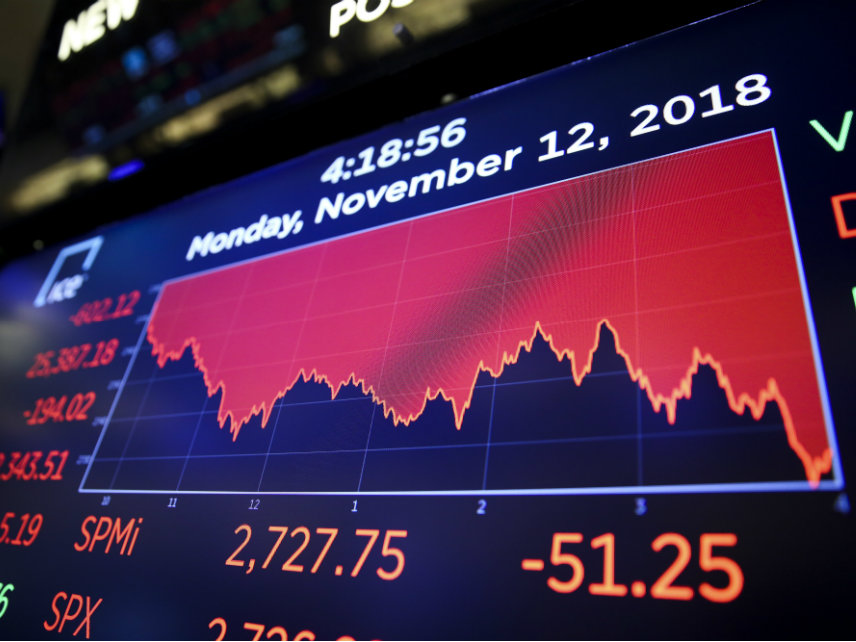Stock Market Woes Worsen As Trade War Worries Grow
The Dow Jones has lost 500 points since President Donald Trump launched his trade war.

It was another brutal day for Wall Street, with the Dow Jones Industrial Average falling more than 550 points on Tuesday after losing more than 400 points on Monday.
Similar sell-offs in other major indices caused the S&P 500 to drop 1.8 percent on Tuesday (following losses of 1.7 percent on Monday). Both the Dow and the S&P are now in negative territory for the year. The Nasdaq Composite, which includes mostly tech-oriented stocks, is still barely above water for the year as a whole, but has lost nearly 15 percent of its value since October 3 and is down about 9 percent since November 7.
Worse may be on the way. More than half of the chief financial officers included in a periodic survey by CNBC say they expect the Dow to drop below 23,000 points—as of Tuesday afternoon, it was sitting at 24,500 points—before it stabilizes. That would wipe out not only all the gains from 2018, but would represent the lowest point for the major industrial index since October 2017.
Failure may be an orphan, but this stock market correction seems like it's being raised by a village. Tech stocks are getting hammered, the financial benefits of last year's tax cut are waning, the national debt is again closing in on the $1 trillion threshold (and corporate debt is creeping into record territory too), and the Federal Reserve keeps making noise about raising interest rates—a move that would marginally advantage savings rather than investing and could also slow growth.
And then there's the trade war. Many executives seem to believe President Donald Trump's tariffs and the threat of an ongoing economic dispute between the U.S. and China are the single biggest concern facing the nation's economy in the coming months. In that same CNBC survey, 35 percent of chief financial officers said the trade war was their top concern for the fourth quarter of 2018.
The Trump administration has already imposed tariffs on $250 billion of Chinese imports, and many of those tariffs are set to increase from 10 percent to 25 percent at the start of 2019. Meanwhile, other tariffs on steel and aluminum are continuing to hurt American manufacturers and automakers, and the White House's threat of imposing more tariffs on additional Chinese-made items and foreign cars hangs over the economy as the year comes to a close.
Pessimism about the White House's trade policy has been growing for a while, but it may have finally spilled over into the stock market in a big way. Though you could argue about the causal link, the sell-offs on Monday and Tuesday—coming less than 48 hours after Vice President Mike Pence delivered a firey speech promising a protracted trade war with China—seems like some kind of sign.
Indeed, the signs have been there for a while. In August, a Reuters poll of more than 100 economists revealed that most of them expect economic growth to slow over the next two quarters as the boost created by last year's tax cuts fades and Americans begin to feel the costs of the tariffs. Around the same time, members of the Federal Reserve warned that further escalation of the trade war could have "consequential downside risk" to the economy.
This is a particularly acute problem for tech companies—and, as luck would have it, tech companies had been driving the recent bull market. The so-called FAANG stocks (Facebook, Amazon, Apple, Netflix, and Alphabet, which owns Google) have found themselves on the vangard of the downward charge, with each down at least 20 percent from their 52-week high.
Apple's decline has been particularly noteworthy. As The Wall Street Journal noted Tuesday, demand for the new iPhone has been slower than expected, with consumers apparently unwilling to pay higher prices. Depending on the model, new iPhones cost somewhere between $750 and $1,000—an increase of about 10 percent to 15 percern from similar models introduced in 2016.
As the Journal's Justin Lahart writes, Apple's experience is instructive. While smart phones are not yet subject to tariffs, the cost increases forced by Trump's trade policy forces businesses to choose between raising prices (and losing customers) or cutting profit margins. Either way, investors get the shaft.
That's why, at the end of the third quarter, dozens of major American companies said trade issues and tariffs were red flags for future earnings. Tariffs are taxes, after all, and it was only a matter of time before a major tax increase on imports would trickle down to higher production costs, lackluster earnings reports, and deflating stock prices.
Look back further and it appears that the stock market was warning us about the consequences of tariffs almost from the day that Trump announced that he would slap new import taxes on steel and aluminum. At noon on March 1, when Trump announced his plans to start a trade war, the Dow Jones was at 24,950.
Despite peaking at 26,700 in mid-summer, the story on the stock market for the past nine months has been one of volatility and growing worry.
The Dow tipped below the 24,950 mark on Monday morning. By today's closing bell, it was down to 24,465 points. Trump's trade war is now officially in bear territory.


Show Comments (163)